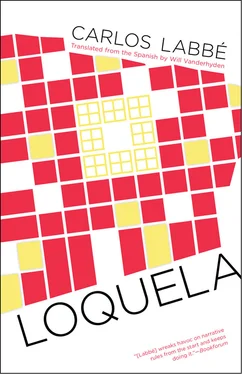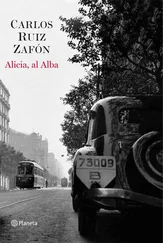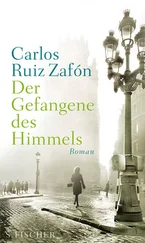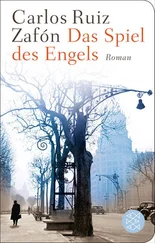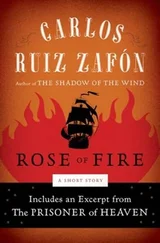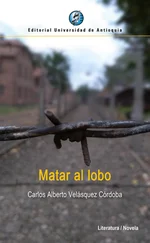He was the protagonist. He used his own name or simply He Who Is Writing the Novel, depending on his mood. He reiterated his own physical features, those hands that were too much for him and that I sometimes held between my own; again and again you enumerated the stages of the novel-writing process, and during the book you split into two, three, even four. You asked me if I’d fallen asleep, I swallowed a sound that signified yes and adjusted my position against your chest. You kept one hand on my head and another on my back, you were smiling because my slack body was at your disposal, what you didn’t realize was that your hands were also prisoners of my weight.
He Who Is Writing the Novel had resolved to carefully follow the movements, alive and dead, of The Young Poet: that his body had been found in a grave of disappeared people, that he might have ended up a beggar under the bridge, just as he’d predicted in his own posthumous poems. Waking up I asked him if he really believed that the painting we’d found in the professor’s house had been painted by The Young Poet, by his adolescent hands that experimented with rhymes. He Who Is Writing the Novel tried to get up to find something that would verify his suspicions — an article by an art critic, a photo, a reproduction of the painting — in vain, all my weight was still on top of him. I’m an obstacle, he said. I asked him again if he really believed this; he kissed me and answered: my little skeptic. I couldn’t laugh in that moment because he had one of his fingers between my teeth and I didn’t want to make him bleed. He added that to follow closely the path of one writer we couldn’t pretend to be inside the skin of another; and since he hadn’t had the privilege of being The Young Poet, it occurred to him to write down a plan so that anyone else would be able to trace his steps. A map, he summarized. He would describe the passage from writing to simulation — and from simulation to application to belief — that The Young Poet had followed. I looked out at the Neutrian sea, at the old houses near city hall, the buildings, the forest, the old port and the new one, the park, everything visible from that balcony, and thought about what he was saying: to tell how a boy writes verses about a character who paints the portrait of a beggar to in the end become that beggar, that character who paints, that boy who versifies, that narrator who narrates. Or instead to memorize the verses, hold the paintbrush, say that among the portraits of beggars that one portrait exists, give everything away, stop eating, remain silent when spoken to, go to the bridge, convert. Divide an author into his characters just to see if it’s true that in so doing you can arrive somewhere far away. And once you’re far away, recover the author in the characters from a distance, insignificant; be The Young Poet. To achieve this he had to imagine how he spoke, the way he moved, to what extent he faltered when he walked. That was why he needed to write a novel, to follow one writer until he became another writer, never the same one. It’s just that there would come a point when it would become impossible to deny that something false was sustaining the project, something that would make him lose all motivation, put his notebooks aside, do nothing for hours, months, years, until his own indolence ended up turning him — definitively, without words — into a beggar. And I, sleeping on his chest, confused what he was telling me with a dream in which the inhabitants of Neutria came, one by one, to enter me like a rented costume left on the floor after a party, while Alicia continued to smile at me from the living room of our apartment. I woke up when He Who Is Writing the Novel removed his hand from my hair, upset because I hadn’t paid attention to him, asking me why I arranged things to always hear the same words, as if I couldn’t understand. As if I were stupid. And it was always the same for me: character and author, the sea and the shore; our boat and the dock from where we just set sail.
Alicia got up from her armchair, hurt by the way He Who Is Writing the Novel was treating me. The afternoon sun reflecting off the big window blinded me, and yet I was able to see her take a chair, climb up to the top shelf in our closet, and pull out a large suitcase. I was alarmed.
I heard the voice of He Who Is Writing the Novel mixed with other voices, adult voices, serious, busy, absent: voices that spoke of literature, of how admirable it was that young students continued to participate in cultural activity. A deep voice indicated that the important thing wasn’t to write or to read, but to publish; it didn’t matter what you made so long as you made something. A sharp voice made reference to money available for State creation grants, the need to fill this city lacking in history with stories; someone similar to He Who Is Writing the Novel agreed, and someone else, also similar to him, listened very intently to the advice they gave regarding the earnings a young writer could expect if he gave up writing in favor of plot, like on TV but in a book. Two writers who’d been published and honored in other countries entered through the door to the university auditorium, found their seats and sat there drinking without saying a word to each other, despite the fact that they’d known each other for more than a decade. On the opposite side of the auditorium, the students were finding glasses of wine, touching, and occasionally, between fits of laughter, flipping through previous issues of the student literary magazine that was being presented that afternoon. A man, identical to the one talking on my apartment terrace, had to cover his face and sneak off to the bathroom — his expression was a grotesque laugh, a wail — when the rector commented that he probably wouldn’t have time to read that issue of the magazine either, but that he was still grateful that they’d sent the previous editions to his office, and that he had no doubt about the quality of the students’ contribution to the cultural profundity of the institution. The lights were slowly coming down.
The professor watched me from a distance through the glass of red wine he was holding against his forehead, without waving, without flirting, without even asking. I observed all of the boys identical to He Who Is Writing the Novel behind the long table, manipulating microphones, slurping their shimmering cups of water without really drinking, making their teeth clink against the glass. Beside each of them was an albino girl, a face overly familiar to me; and yet I was sitting at the back of the auditorium, and, through various altercations, I’d been able to keep the seat beside me unoccupied for Alicia, although I imagined that she wouldn’t be showing up again in that auditorium or anywhere else at the Universidad de Neutria. With arms crossed, He Who Is Writing the Novel read from the pages he’d left strewn across the table in mock disorder; at his side was another boy, just like him, who rested his head on his hand and smiled, ironically, thinking about the unanticipated public turnout at that presentation; and there he was again in front of the microphone, eyes directed to an empty spot in the corner of the room, and again head resting on the windowpane, sitting on the floor, everywhere. He was searching for my white hair in the audience and yet in his hands he held the hair of an albino girl who was sitting beside him; I adjusted the microphone on the table at the event, trembling because my finger wasn’t finding the switch or because the audience would hear my ragged breathing, my gasps, my ignorance: what was I doing there if I couldn’t remember Corporalism, if I wasn’t able to get ahead of the facts of the novel being told to me by He Who Is Writing It. The lights were coming down in the auditorium, little light, I saw myself small two places farther back, in front of myself, there to the left, to my right, behind; I was grateful you hadn’t wanted to come, because you never stop talking and that would’ve made me nervous.
Читать дальше
